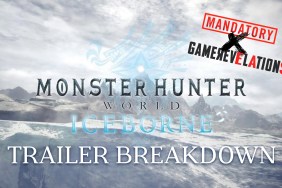Repetitiveness is tricky beast in video games. If a game’s core gameplay is fun, then doing it repeatedly is rarely an issue. We saw this in Dying Light, which relied on a well-made freerunning mechanic and gorily-satisfying melee combat to carry it. Trying to boil down a game like Monster Hunter 4 Ultimate is much more difficult, but you could say it’s ultimately (no pun intended) a small human hitting a series of large monsters until they stop moving. While a lazier development team could have made this boring, Capcom kept Monster Hunter 4 fresh and fun in the most basic and simultaneously complex ways.
While Monster Hunter 4 may be Japan’s Call of Duty, also sporting a basic, but well-executed premise that’s wildly popular in the individual markets, it’s impossible to compare the two when talking about depth. While monster hunting is the premiere mechanic, you’re never “just hunting monsters.” The learning curve in Monster Hunter 4 is a staggering slippery slope to closing your 3DS and regretting your purchase. Those who stay fast, though, will find an intricate world of quests, crafting and dinosaur slaughtering that becomes just as addicting as a game of COD, but without the bloated, energy-drink covered hangover.
A New Adventure Awaits
You’re now a monster hunter. Accept that fact, grab a weapon and hope that the local shop owner needs a favor and will take a chance on your young, precocious amateur self. Prepare yourself for the most fun you’ve ever had, and then play through an hour or so gathering quests. This is where Monster Hunter 4 Ultimate will lose some people, spawning questions like “Why am I gathering these herbs?”, “How the hell does this crafting system work?” or “Why am I only fighting small, easy monsters with chunky combat?” Build up enough esteem in the community doing grunt work, however, and you’ll be rewarded with both answers to that naive line of questioning and actual hunting quests.

Believe it or not, first-timers, this was done better than it was in Monster Hunter 3 Ultimate, where all the boring gathering quests surrounded by the depth of crafting and upgrading systems was thrust upon you in the first chunk of the game, making you play for several hours before encountering any monster with even the slightest challenge or intrigue. Monster Hunter 4 Ultimate sprinkles this information throughout.
There’s a point in all games where the rules of the world are established, and it leaves you to it. Monster Hunter 4 Ultimate works more like a college course, dropping relevant information and introducing new concepts throughout the whole quarter, and the final is cumulative, so you better be taking notes.
The Monsters, and the Things You Kill them With
Monster Hunter 4 has both a new and familiar roster of beasts to play with. Ever fought a dragon who plays dead or a giant scaly pug with a wicked underbite he uses to hurl boulders? Not unless you’ve played Monster Hunter is my guess. Capcom’s creativity is on display in full force once again, and Monster Hunter 4 brings some new toys to use against those creative catastrophes:
The Charge Blade, a sword and shield that build up power with regular attacks before gaining the ability to change into an axe to deliver some heavier blows, and the Insect Glaive, a weapon accompanied by a companion bug that harvests upgrades from slain monsters in real time.
While Insect Glaive has lots of promise, the Charge Blade (albeit fun and likely overpowered) lacks the depth in upgrade paths of other weapons both in 4U and 3U. The only real upgrade path you can take with the Charge Blade involves lots of mining and gathering items not dropped by monsters. That means no fighting, and a whole lot of smacking a pickaxe against sparsely spawning mineral patches, hoping this time you’ll get some damn malachite ore. My advice: have a show on Netflix open in the background when you need to gather these materials to keep you entertained.
Of course, upgrade materials that require hunting aren’t perfect either. Whether or not a monster drops the desired material is entirely based on luck, requiring players to grind the same monster repeatedly. At the same time, that’s not necessarily a bad thing that 4U requires you to hunt more monsters. The fighting and monster design is Capcom’s bread and butter here, so the more the merrier.
A few new features were added to enhance this experience. Being able to scurry up simple ledges in 4U without putting away your weapon is a nice additive that I’m surprised wasn’t always in the series before. This is especially important, too, since, 4U added a mini game where the player can mount a monster from above and stab him repeatedly. This adds another layer to combat that could use a little push in terms of depth.
A Sight Not to See
One of the only bad parts about 4U is looking at it. While the shadows and textures themselves have improved from 3U to 4U, the latter sports a tough-to-watch graphical filtering that only allows the ground textures within a small radius around your character to be in focus.
Even overlooking this, which is especially hard once you notice it, the limitations of the 3DS make it hard for any handheld developer to make their game look good (although Smash Bros. for 3DS was quite the anomaly).
Conclusion
Monster Hunter 4 Ultimate is certainly an improvement on the formula of the series. While it still doesn’t have pick-up-and-play gameplay, 4U makes it easier to get into with a more balanced approach to build-up and payoff. Honestly, a game like this doesn’t need instantly accessible gameplay. Part of the appeal of Monster Hunter is learning and mastering the intricacies, which only happens with time and effort, and 4U does it just as well, if not better, than previous installments.

James Kozanitis is a Contributor for CraveOnline’s Gaming channel. You can follow him on Twitter @JamKozy.
Copy provided by publisher. Monster Hunter 4 Ultimate is exclusive to 3DS.







